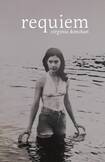Review: Virginia Konchan, a poet of miracles
In 2008, the poets Mary Karr and Franz Wright were in conversation at Calvin College for a writing festival. Their banter was natural, not staid; after all, they had been friends “for almost 30 years,” and, as Karr quipped, they “used to drink and, you know, do cocaine together in another lifetime.” Both sober, and both “trying to be Catholic,” they spoke of being “snatched out of the fire.”
Halfway through their conversation, Wright mentioned Walt Whitman as a poet of miracles. “I know nothing but miracles,” Wright said. “Every single moment is this terrifying, awe-inspiring unbelievable”—and then, both capturing himself and clarifying, he added: “when you’re awake to it.”
Poets vary widely in their styles and sensibilities, but I have noticed that most share two inclinations: association and attention. Poets notice patterns and connections across dissimilar elements of life, and they pay attention. They are awake to the world.
Virginia Konchan is a poet of association and attention, and in Requiem, her fifth book, she takes the sacred seriously. She’s jocular with her subjects, including God, yet in doing so she demonstrates sustained attention toward the divine. God is among her natural poetic vocabulary.
Her collection begins with an epigraph from the Jewish theologian and rabbi Abraham Heschel. The line “God is of no importance unless He is of supreme importance” comes from his 1951 book Man Is Not Alone and follows a rumination. “God is not an explanation of the world’s enigmas or a guarantee for our salvation,” he writes. “He is an eternal challenge, an urgent demand,” and not “a problem to be solved but a question addressed to us.”
Konchan described herself in Tupelo Quarterly as a poet of faith, but said that she often “exercise[s] it through poetry, in conversation with power structures and law.” Like Heschel, she is drawn to impossible questions, ones that are meant to be “(un)resolved.”
Her first poem in Requiem, “Matins,” is comfortable with a lack of resolution, and associates Jewish and Christian traditions. In lines that recall Heschel, she writes: “The philosopher sat shiva with his shadow,/ knowing the truth was without and within.”
The contemplative Christian practice of matins is placed with a broader lineage: “Abraham waited, as did David and Joseph,/ Moses, Hannah, Isaiah, Ruth, Jacob, Paul./ Each hour an unmet hunger, an ardent plea.”
Konchan’s narrator seeks to join this tradition; “will practice awe, bending at the knee.” The narrators in Requiem are open to the mysterious, for “With God, all things are possible, such as God.” In “Apostrophe,” Konchan writes “Truth requires a suspension of belief,/ I said. Science is only half the story.”
The presence of God teems throughout this book, as in these lines from “Ecce Homo”:
Promise Keeper, Miracle Worker, Son
of Man with nowhere to lay your head:
outside the grinding maw of capital is
your voice, recoiling through centuries:
quiet and insistent as needle and thread.
In “Parousiamania,” the narrator is blunt. “Have I accepted Jesus Christ as my Lord / and Savior? Amen. But enough about me.” Although the shape of the divine is a mystery, God’s existence is accepted. It is time for more prosaic concerns: “When bored, I make a list of things I want,/ like a car that runs or jeans that actually fit.”
That poem takes a fascinating turn. The narrator pleads for “Divine Unction in aisle 29, beside/ a pyramid of alabaster toilet paper.” But once resurrected, she will “[commandeer] this/ shopping cart the way people/ are raptured: up, up, and away.”
There is a significant difference between the profane and the penetrating. Konchan demonstrates the latter in her poem “Gloria Patri,” one of the finest in the collection. Catholics will recognize the syntax: “Glory be to the Father, and to the Son, and to the Holy Spirit, as it was in the beginning, is now, and ever shall be, world without end. Amen.”
In Konchan’s able hands, the doxology remains sacred. “Glory be to god for septic tanks, drainage pipes:/ for conversions thermodynamic and of the soul,” she writes. “Glory be to god for this quiet, cheap hotel room:/ only music the mini-fridge’s vibratory drone,/ creaky plumbing groaning through the walls.” The narrator contemplates how “the perfect peace of objects” is juxtaposed with the transient nature of hotel stays. “Before me was another traveler,” the narrator ponders, and “after I leave,/ hundreds of others will arrive.” They will drink water “from disposable plastic cups,” lie back on the bed, and “stare into the void/ of a generic landscape painting across the bed/ while contemplating the disaster of their lives.”
The grime of this room is perhaps as venial as the sins of its main character, and in many ways “Gloria Patri” is a confession: “I acknowledge my poverty of being and my need.”
Mary Karr’s iconic book title Sinners Welcome feels like an apt point of comparison for Konchan’s collection, and her greater project as a poet. In the poem “Wheel of Fortune,” from a previous book, Konchan writes: “Am I a citizen-consumer or a child of God?” An interviewer once questioned the juxtaposition in that line, to which Konchan responded that both are not merely powerless: “a child of God, while externalizing the locus of power to a Godhead, can be empowered through the Holy Spirit or another form of divine inspiration.” The role of the lyric speaker or narrator is to “give voice to anyone or anything, from inanimate matter to the very person of ‘God.’”
In that vein, perhaps the ultimate subject of Konchan’s attention in Requiem is an extended elegy for her mother. In “Valediction,” she writes of seeing her mother in hospice:
I touched her skull, raised in parts by a shunt—
implanted to drain excess cerebrospinal fluid
from her brain—feeling her form like Braille.
The lines, however jarring, are a force of attention. The comedic touches of Requiem clear the poetic air for the later, more solemn poems. In “Prelude,” she writes: “Most of my life has been a spectacular failure.” She thinks how mistakes are, collectively, “a lesson in epistemic humility.” After a life of pain, she is changed but not doomed: “I’m not paralyzed, I’m praying.” She ends the poem with a bittersweet couplet: “I need another life to get it right,/ to inaugurate the impossible again.”
Yet Konchan the poet, and Konchan the lyric narrator, recognizes that we only get this one, earthly, corporeal life, and that makes poems like “Breviary” all the more meaningful. The penultimate poem of the book, it begins with the narrator learning of her mother’s death while “driving to see her.” Upon reaching the room, she splays across her mother’s “barely sallow” body, weeping, while her brother has “opened the window to let her spirit fly away free.”
The narrator reads Corinthians, Dickinson and Langston Hughes to her mother at the wake. At the funeral, she contemplates the inadequacy of language to calm grief, the pain: “the consoler and the inconsolable rudderless at sea,/ watching unforeseen tragedies congeal into history.”
Konchan, and her narrator, know poetry can also be a hymn of resurrection. She begins each day by “saying her name, Theresa,/ asking her what were her dreams, how she slept.” Konchan creates a stay against despair at the end of the poem, a move that captures Requiem’s emotional range. It recalls my favorite poem by Franz Wright, “Rosary,” about Mary, which concludes: “See them flying to see you/ be near you,/ / when you/ are everywhere.”
Speaking to her mother, the narrator says words of consolation—for both of them: “They don’t know you are alive in every goodness,/ every wink, every cell and atom dissolving in air.”
This article also appeared in print, under the headline “Poet of Miracles,” in the July/August 2025, issue.










